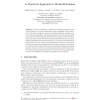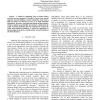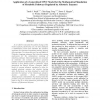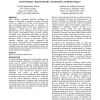ECAI
2008
Springer
15 years 4 months ago
2008
Springer
Both for developing human-like virtual agents and for developing intelligent systems that make use of knowledge about the emotional state of the user, it is important to model the ...
CSMR
2008
IEEE
15 years 4 months ago
2008
IEEE
Propagating incremental changes and maintaining traceability are challenges for interactive model transformations, i.e. ones that combine automation with user decisions. After evo...
115
click to vote
CSCW
2008
ACM
15 years 4 months ago
2008
ACM
This article presents a rational model developed under the distributed cognition framework that explains how social tags influence knowledge acquisition and adaptation in explorat...
ECMDAFA
2007
Springer
15 years 4 months ago
2007
Springer
In object technology, reusability is achieved primarily through class inheritance. In model engineering, where reusability is also important, it should be possible to extend a mode...
112
click to vote
CMSB
2008
Springer
15 years 4 months ago
2008
Springer
Model checking has historically been an important tool to verify models of a wide variety of systems. Typically a model has to exhibit certain properties to be classed `acceptable&...
136
click to vote
CMSB
2008
Springer
15 years 4 months ago
2008
Springer
Kinetic models for biochemical systems often comprise a large amount of coupled differential equations with species concentrations varying on different time scales. In this paper w...
112
click to vote
DIAGRAMS
2006
Springer
15 years 4 months ago
2006
Springer
Abstract. We present a method for constructing a teleological model of a drawing of a physical device through analogical transfer of the teleological model of the same device in an...
141
click to vote
CSB
2005
IEEE
15 years 4 months ago
2005
IEEE
In our effort to elucidate the systems biology of the model organism, Escherichia coli, we have developed a mathematical model that simulates the allosteric regulation for threoni...
125
click to vote
CRITICAL
2005
15 years 4 months ago
2005
While affective computing explicitly challenges the primacy of rationality in cognitivist accounts of human activity, at a deeper level it relies on and reproduces the same inform...





